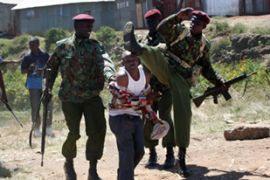Kenya opposition rejects unity call
Political deadlock continues amid calls from opposition for the president to resign.

Kabira offered no details and would not say whether it was a formal offer to Odinga.
International mediator
Odinga said that talks must be brokered by a mediator outside Kenya, a condition the government has flatly rejected, and insisted that the current crisis was domestic.
| In video |
“Our condition is only that there is an international mediator,” Odinga said after he held talks with Frazer.
According to Al Jazeera’s Yvonne Ndege, reporting from Nairobi, Kufor’s visit has come late, because he was supposed to be one of the first international mediators to arrive in Kenya when violence erupted.
She said: “For some reason, his visit was shelved for some time.”
“My sense is that Kufour’s visit symbolises ‘an African solution to an African problem’ initiative. What will come of it is very hard to tell at this stage.”
On Friday, Odinga’s ODM party called for presidential re-run within 90 days, but the government shrugged off the demand, insisting that Odinga and his team should seek legal redress.
What started as political clashes rapidly evolved into deadly tribal violence, claiming at least 360 lives and displacing at least 250,000 people, mainly in the country’s Rift Valley region, home to a number of tribes supporting rival sides.
|
Your Views |
| Send us your views |
While the country now grapples with an unprecedented humanitarian crisis, Ali Mohamed Hussein, Kenya’s chief of police, said that violence was in fact subsiding in the country.
